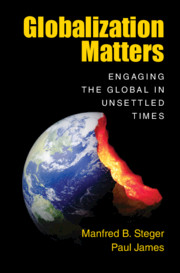Book contents
- Globalization Matters
- Globalization Matters
- Copyright page
- Contents
- Figures
- Acknowledgements
- 1 Introduction
- 2 Mapping a New Genealogy of ‘Globalization’
- 3 Rethinking the Dominant Framework of Globalization Theory
- 4 Considering the Subjective Dimensions of Globalization
- 5 Outlining an Engaged Theory of Globalization
- 6 Excavating the Long History of Globalization
- 7 Examining the Promise of Global Studies
- 8 Making Sense of the Populist Challenge to Globalization
- 9 Confronting the Global Urban Imaginary
- 10 Living in the Unsettled World of the Anthropocene
- 11 Concluding Reflections
- Appendices
- Bibliography
- Index
10 - Living in the Unsettled World of the Anthropocene
Published online by Cambridge University Press: 01 August 2019
- Globalization Matters
- Globalization Matters
- Copyright page
- Contents
- Figures
- Acknowledgements
- 1 Introduction
- 2 Mapping a New Genealogy of ‘Globalization’
- 3 Rethinking the Dominant Framework of Globalization Theory
- 4 Considering the Subjective Dimensions of Globalization
- 5 Outlining an Engaged Theory of Globalization
- 6 Excavating the Long History of Globalization
- 7 Examining the Promise of Global Studies
- 8 Making Sense of the Populist Challenge to Globalization
- 9 Confronting the Global Urban Imaginary
- 10 Living in the Unsettled World of the Anthropocene
- 11 Concluding Reflections
- Appendices
- Bibliography
- Index
Summary
This chapter concludes Globalization Matters with one of the most pressing issues of all: what does it mean that, at the height of our capacities as humans to command technological change and produce the means of our existence many times over, we have reached a point in human history when we have the capacity to destroy the planet as we know it? This is the ultimate form of globalization—the globalization of our own possible demise. Two themes are discussed. First, the possibilities of military violence have been stretched to ongoing global proportions, whether it be annihilation through nuclear exchange, ragged attrition through a global war on terror, or disruption through localized transnational violence. Second, incremental and escalating ecological destruction has brought global debates to the point of pronouncing a new global epoch: ‘the Anthropocene’. The task of giving the term practical consequence has been constantly and actively deferred by most policy-makers. This chapter explores the uneven and fractured nature of these global process and debates, arguing that there is now too much at stake to leave it to those who think that nothing consequential needs to change.
Keywords
- Type
- Chapter
- Information
- Globalization MattersEngaging the Global in Unsettled Times, pp. 230 - 250Publisher: Cambridge University PressPrint publication year: 2019



